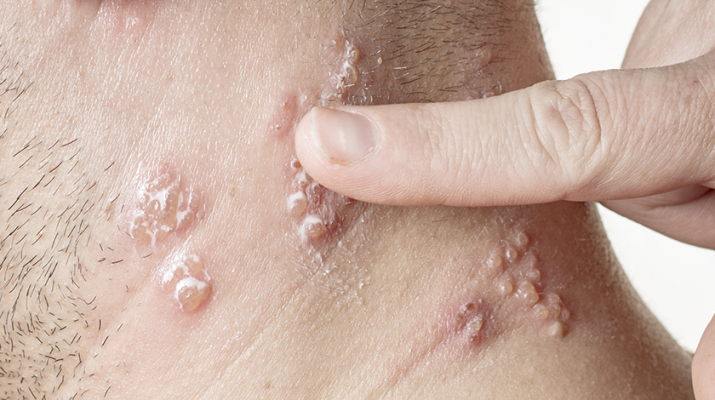For experts, it’s a no brainer. If you had chickenpox as a child and are over 50, you should get the vaccine
By Deborah Jeanne Sergeant

You faithfully receive your flu vaccination every fall, but have you thought about shingles?
If you’re like most people who had chickenpox as a child, you have a risk of developing shingles once you hit your 50s or 60s.
That’s why physicians such as Elise DeLuke, dermatologist with DeLuke Dermatology in Amherst, recommend that adults aged 50 and older who have had chickenpox receive shingles vaccine.
“Some people who think they didn’t have chickenpox did have it and they’re not aware of it,” DeLuke said.
Also known as herpes zoster, shingles occurs when the dormant virus that causes chickenpox reactivates in the body later in life. About one-third of the population that has had chickenpox later develops shingles.
“If it is on the face near the eye, it should be taken care of by an ophthalmologist,” DeLuke said. “It can cause serious problems. It can get inside of the mouth. It’s more painful but it’s not as dangerous as the eye.”
The vaccine reduces patients’ risk of developing shingles by 50 percent or more, according to experts
People at higher risk for shingles have experienced chickenpox and have a depressed immune system because of stress, injury, medication or unrelated disease.
DeLuke added that the only contraindications to the shingles vaccine are allergies to one or more of the components of the vaccine, usually gelatin or neomycin. The other contraindications are conditions or medication that suppress the immune system, such as chemotherapy drugs.
The vaccine reduces patients’ risk of developing shingles by 50 percent or more.
Vaccination can also help prevent the spread of illness to others who are not or cannot be vaccinated, such as yet-unvaccinated babies, who can develop chickenpox from an adult’s case of shingles.
Local reaction at the injection site is the most common side effect. Some insurance plans cover shingles vaccination.

Shingles starts with a sensation of burning, pain or tingling in an area of the body, sometimes as a band, but only on one side of the body. Within two days, infectious lesions form (once they form a crust, the patient isn’t contagious).
Topical preparations can reduce pain at the site, while oral anti-viral medication can help reduce the duration.
“If you get shingles, get medication within the first 72 hours,” DeLuke said. “If you do get the medication, it decreases the length and severity and likelihood of persistent pain.”
Called post-herpetic neuralgia, these lifelong flare-ups occur in the same place manifesting lesions. About 20 percent of patients experience post-herpetic neuralgia. Some describe it as burning, stinging, shooting pain in the skin that any slight contact sets off, such as clothing brushing against the skin.
“Oftentimes, you can expect someone will feel numbness and tingling post-infection,” said Melissa Mele-Delgado, board certified with a doctor of nursing practice degree, who works at Neiman Dermatology in Williamsville. “For most, it dissipates. Post-herpetic neuralgia can last for years. Some have to go on medication. I had a patient with her entire left arm covered with countless lesions. She has pain in her thumb so bad she says she wishes she could cut it off.”
Anyone approaching 50 should discuss shingles vaccination with a primary care provider.

